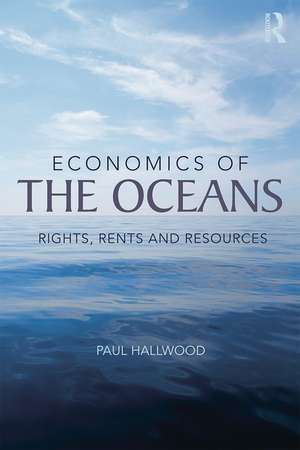Economics of the Oceans: Rights, Rents and Resources
Autor Paul Hallwooden Limba Engleză Paperback – 10 feb 2014
Themes covered in the book include ocean governance, the economics of oceanic resource exploitation, offshore oil, coral reefs, shipwrecks and maritime piracy. Analytical techniques such as basic game theory, environmental economics of the commons and cost-benefit analysis are employed to illuminate the topics.
This book will be of interest to students of environmental economics, natural resource economics and management, and the economics of international law as relating to the oceans.
| Toate formatele și edițiile | Preț | Express |
|---|---|---|
| Paperback (1) | 387.56 lei 6-8 săpt. | |
| Taylor & Francis – 10 feb 2014 | 387.56 lei 6-8 săpt. | |
| Hardback (1) | 766.65 lei 6-8 săpt. | |
| Taylor & Francis – 18 feb 2014 | 766.65 lei 6-8 săpt. |
Preț: 387.56 lei
Preț vechi: 499.82 lei
-22% Nou
Puncte Express: 581
Preț estimativ în valută:
74.16€ • 77.43$ • 61.24£
74.16€ • 77.43$ • 61.24£
Carte tipărită la comandă
Livrare economică 16-30 aprilie
Preluare comenzi: 021 569.72.76
Specificații
ISBN-13: 9780415639118
ISBN-10: 0415639115
Pagini: 320
Ilustrații: 49 black & white illustrations, 12 black & white tables, 49 black & white line drawings
Dimensiuni: 156 x 234 x 23 mm
Greutate: 0.45 kg
Ediția:New.
Editura: Taylor & Francis
Colecția Routledge
Locul publicării:Oxford, United Kingdom
ISBN-10: 0415639115
Pagini: 320
Ilustrații: 49 black & white illustrations, 12 black & white tables, 49 black & white line drawings
Dimensiuni: 156 x 234 x 23 mm
Greutate: 0.45 kg
Ediția:New.
Editura: Taylor & Francis
Colecția Routledge
Locul publicării:Oxford, United Kingdom
Public țintă
Postgraduate and UndergraduateCuprins
Part I: Introduction 1. Ocean Resources, Ocean Governance Part II: Historic Wrecks, Modern Pirates 2. Economic Analysis of Legal Regimes Governing Salvage of Historic Shipwrecks 3. The Economics of Maritime Piracy 4. Maritime Piracy and International Law Part III: Enclosure 5. Enclosure of the Oceans 6. An Economic Analysis of Drawing Lines in the Sea 7. Division of Economic Rents in the Timor Gap Part IV: Fisheries Economics 8. Economics of the Fishery 9. Management of Fish Stocks Part V: Fisheries Regime Formation 10. Impatience, Ecology and Fisheries Regime Formation 11. International Negotiations 12. Preponderant Actors and the Bargaining Game 13. Managing High Seas Fisheries 14. How and Why to Make a Fishery Treaty Ineffective Part VI: Marine Mammals 15. Whales Part VII: Coral Reefs, Marine Protected Areas, Wetlands 16. Coral Reef Economics 17. Marine Protected Areas, Optimal Policing and Optimal Rent Dissipation 18. Contractual Difficulties in Environmental Management: The case of wetland mitigation banking Part VIII: Pollution 19. Oceans and Non-Point Source Pollution 20. Oil Pollution from Ships Part IX: Minerals 21. Taxing Offshore Oil and Gas 22. US Royalty Relief, Rent Sharing and Offshore Oil Production 23. Deep Sea Mining
Notă biografică
Paul Hallwood is Professor of Economics at the University of Connecticut, USA.
Recenzii
'This unique study combines ecological concepts and neoclassical economic models with case studies to analyze critical problems relating to the oceans. Using the perspectives oflaw and economics, Hallwood (Univ. of Connecticut) provides both historical context and a discussion of how conflict resolution institutions may help solve problems pertaining to oceans. This book will interest students of environmental economics, natural resource economics and management, and the economics of international law.
Summing Up: Highly recommended.' — B. F. Hope, emeritus, California State University, for CHOICE
'Finally a textbook that covers more than just fisheries! This is the perfect companion for the growing number of courses focused on how society uses and abuses the scarce resources of the ocean' — John Lynham, University of Hawaii at Manoa, USA
Summing Up: Highly recommended.' — B. F. Hope, emeritus, California State University, for CHOICE
'Finally a textbook that covers more than just fisheries! This is the perfect companion for the growing number of courses focused on how society uses and abuses the scarce resources of the ocean' — John Lynham, University of Hawaii at Manoa, USA
Descriere
This book provides a comprehensive introduction to the economic uses of oceanic resources, the rights to exploit them and the division of the economic rents, or surpluses, between sovereign powers, and individual users of ocean space.







